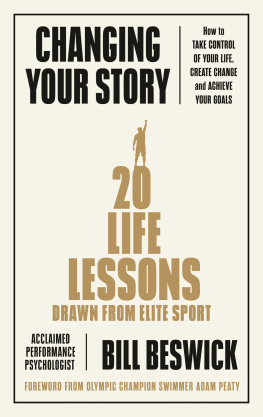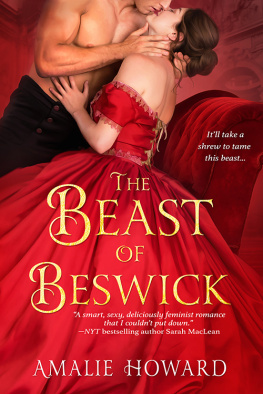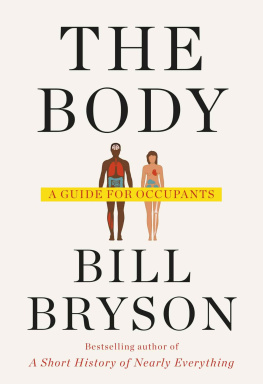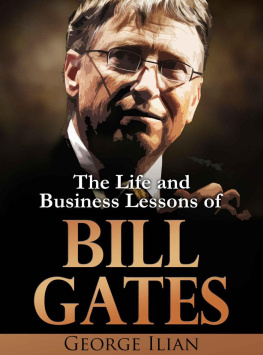Bill Beswick
CHANGING YOUR STORY
20 Life Lessons Drawn from Elite Sport

PENGUIN BOOKS
UK | USA | Canada | Ireland | Australia
India | New Zealand | South Africa
Penguin Books is part of the Penguin Random House group of companies whose addresses can be found at global.penguinrandomhouse.com.

First published by Penguin Life in 2021
Copyright Bill Beswick, 2021
The moral right of the author has been asserted
Cover design by Pete Adlington
ISBN: 978-0-241-44803-8
This ebook is copyright material and must not be copied, reproduced, transferred, distributed, leased, licensed or publicly performed or used in any way except as specifically permitted in writing by the publishers, as allowed under the terms and conditions under which it was purchased or as strictly permitted by applicable copyright law. Any unauthorized distribution or use of this text may be a direct infringement of the authors and publishers rights and those responsible may be liable in law accordingly.
To my much-loved grandchildren, Tom, Lucy, Katy, Alfie, Arlo and Otis. I trust you all to change the story for our family in new and wonderful ways.
Foreword
It has been my good fortune to naturally have a strong competitive mindset, and that has been reinforced during my time as a swimmer for Great Britain with the introduction of sport psychology and Bill Beswick. Bill shared with us new perspectives to high performance and the first thing he said has always stuck in my mind: the mind is the athlete, the body simply the means.
From that moment on my coach, Mel Marshall, and I have made the training of my mind an important part of our preparation. Ive worked constantly to become a champion and that is in large part due to my thinking like a champion every day at training. There have been problems of course and a couple of setbacks, but Bill taught us to deal with, and not react to, such difficulties.
It is great that in this book you can share the stories that I enjoyed and learned from, plus some of the strategies for building mental strength and keeping emotional control key arena skills that played a significant part in Great Britains swimming success in the 2016 Olympic Games. On one evening in Rio in front of a capacity crowd and the worlds television audience I had just fifty-seven seconds to produce the performance of my life and win the gold medal. At that moment the mind takes over and tests your ability to produce a disciplined performance under pressure. Superb physical preparation and a focused and strong mindset were the keys to my success.
It is my belief that the experience of high-performance swimming and its physical and mental challenges have made me a better person as well as athlete. In this book Bill offers you an opportunity to grow your mind and think like a champion. I recommend it to you!
Adam Peaty MBE
World, Olympic, European,
Commonwealth and British Champion
Introduction
This is a book of stories. I was raised to be a storyteller. On Sundays in a house without television my father would ask each of his four sons (I was the youngest) to tell the story of their football or rugby game the previous day. The king of storytellers was my eldest brother, Fred, and each week the way he brought his game to life stayed with me for many days. His team was heroic, the opponents were the villains, and the plot was always overcoming the threat of failure to gain an improbable victory. Fred, often the hero, was fortunate that his stories were told in the days before cameras recorded the truth! These were fascinating stories for a young boy, and I used them to imagine what I would have done in the same circumstances. It was no surprise that sport became my main interest and storytelling became part of my style as a teacher, coach, lecturer and performance psychologist.
Years later, I was to encounter another fireside storyteller, who reminded me that stories are not just central to who we are as individuals but the glue that holds us to other people. Before the fall of the Iron Curtain, I was one of a group of college lecturers visiting the then Czechoslovakia to promote higher education. One evening, I was invited by our host liaison officer to a barbecue at the edge of a small town. It was a simple bonfire in the middle of a field with sausages and potatoes cooked on the fire. Drinks were very limited. The highlight of the evening was when an old man suddenly got up from his seat and began walking around the fire. Everybody joined him apart from me. I stayed watching, absorbed by what was happening. My host explained that this was the village storyteller who maintained and retold the myths and legends of their shared history, reinforcing their community heritage and adding stories of the recent past. As I saw how engaged, energized and connected the crowd was with the storyteller, the power of storytelling was underlined in a unique yet universal way.
Humans are storytelling creatures, and the importance of storytelling is well documented by anthropologists and social scientists. Although the means of communication has evolved from cave paintings to todays social media, the influence of powerful stories has not lessened. Culture is absorbed, and life lessons can be learned through the heritage of stories passed from one generation to the next, across communities and through interest and friendship groups. Stories emotionalize information, validate behaviour and forge social connections, and that makes them memorable as a basis for changing our lives.
The world of sport is perfect for stories, because sport is not just motion but motion wrapped in emotion. It is full of unlikely heroes, love-to-hate bad guys, the triumphs of the underdog and against-all-odds victories. From my brothers fireside tall tales to the most dramatic and exciting Olympic and World Cup victories (or defeats!) the stories we tell from the sporting world have a way of capturing our imaginations and inspiring our actions outside of the arena. Life and sport are both about human connection, and stories, with their emotional power to convey messages with impact, connect us to the lives of others. Stories are particularly powerful when they carry meaning that helps us make sense of our own lives.
Nobody understood the power of stories and emotion to help people face their challenges better than the late, great USA basketball coach Jim Valvano. Jim was a wonderful storyteller who was diagnosed with terminal cancer at the age of forty-six. He was persuaded to make one final speech. Helped onto the stage, his last message was:
We should do three things every day of our life. Number one is laugh. You should laugh every day. Number two is to think, we should spend some time in thought. And, number three is you should have your emotions moved to tears. If you laugh, think and cry, that is one heck of a day.
Jim understood that life can be both joy and pain, and that its OK to be imperfect and vulnerable providing you accept and embrace it.
Stories from sport are particularly valuable because, though sport is seen primarily as physical activity, a challenging contest can arouse a range of emotions and reactions and thus reflect many of the situations we meet in our ordinary lives. The athletes emotional intelligence and ability to control themselves will determine whether these emotions are empowering or disempowering. In addition, sport is seen as individual and highly competitive, though it is, in fact, remarkably social and collaborative. In sport we see ordinary people doing extraordinary things (taken from another Jim Valvano quote). I have come to regard sport as stories of human connection under challenge, competition, pressure and fatigue, dominated by the intangibles of thoughts and feelings.















